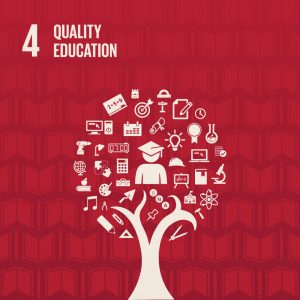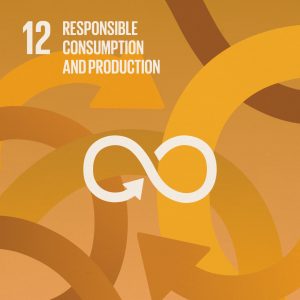by Randy Martin, Office of Sustainability
Auburn’s vision and mission statement declares, “Auburn University is dedicated to improving the lives of the people of Alabama, the nation, and the world through forward-thinking education…”.
We can’t have a forward-thinking education without teaching sustainability. Sustainability is already permeating every facet of our lives. From the clothes we wear, to the cars we drive, to the food we eat. It is only logical then that every facet of our learning is laced with sustainability.
Academics are one thing, but a significant amount of time and learning is done outside of the classroom. Not to mention that if sustainability was only taught in a classroom, then most of Auburn’s 6,000 employees would be left out. That is why ¹STARS has created a subcategory called On-Campus Engagement. This includes co-curricular activities, outreach campaigns, employee engagement, and employee training.
Also, STARS connects this category (On-Campus Engagement) to three of the United Nations Sustainable Development Goals.
- Goal 4: Ensure inclusive and quality education for all and promote lifelong learning
- Goal12: Ensure sustainable consumption and production patterns
- Goal 13: Take urgent action to combat climate change and its impacts
Subcategories
This category consists of nine subcategories, worth 21 points in total.
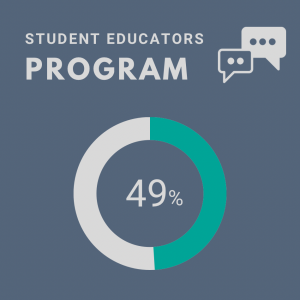 1. Student Educators Program: The most efficient way to learn comes from teaching. So, STARS credits institutions that have peer-to-peer educational programs. These programs must contain a sustainable ethic, such as an Eco-Reps program or a wellness counselor. These programs allow students to develop personally while also spreading sustainable concepts and ideals.
1. Student Educators Program: The most efficient way to learn comes from teaching. So, STARS credits institutions that have peer-to-peer educational programs. These programs must contain a sustainable ethic, such as an Eco-Reps program or a wellness counselor. These programs allow students to develop personally while also spreading sustainable concepts and ideals.
Auburn’s score: 1.96/4
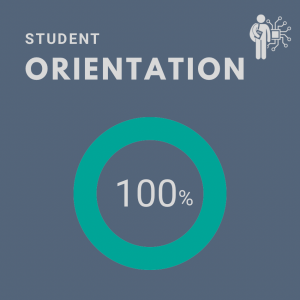 2. Student Orientation: The very first step of attending a new university is orientation. It’s often the first time a student can feel the true personality of the school. Like many schools, Auburn uses orientation to ensure each incoming student is aware of our ideals. That is why STARS rewards institutions that incorporate sustainability into their orientation activities and programs.
2. Student Orientation: The very first step of attending a new university is orientation. It’s often the first time a student can feel the true personality of the school. Like many schools, Auburn uses orientation to ensure each incoming student is aware of our ideals. That is why STARS rewards institutions that incorporate sustainability into their orientation activities and programs.
Auburn’s Score: 2/2
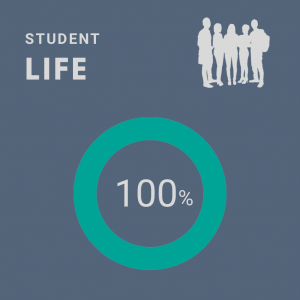 3. Student Life: From gaining experience in the field to networking with like-minded people, co-curricular activities can have a huge impact on a student’s life. That is why it is essential to offer activities that incorporate sustainability principles and practices. STARS awards institutions with co-curricular programs that contribute to learning about sustainability outside the classroom. Outdoor programs, community gardens, speaker series, and sustainable investment funds would all be a part of this category.
3. Student Life: From gaining experience in the field to networking with like-minded people, co-curricular activities can have a huge impact on a student’s life. That is why it is essential to offer activities that incorporate sustainability principles and practices. STARS awards institutions with co-curricular programs that contribute to learning about sustainability outside the classroom. Outdoor programs, community gardens, speaker series, and sustainable investment funds would all be a part of this category.
Auburn’s score: 2/2
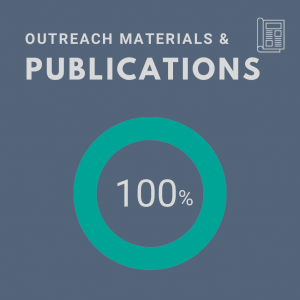 4. Outreach Materials and Publications: Sustainable solutions will look different at every
4. Outreach Materials and Publications: Sustainable solutions will look different at every
campus because the needs and culture of every campus are different. A way to take the burden off students and employees is to present materials that are catered to our specific campus needs. So STARS awards points to institutions that produce materials like newsletters, websites, and guides to educate and inform.
Auburn’s Score: 2/2
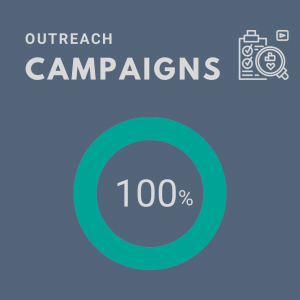 5. Outreach Campaigns: Well-executed outreach campaigns can raise student awareness and
5. Outreach Campaigns: Well-executed outreach campaigns can raise student awareness and
create tangible benefits for the campus and the broader community. STARS credits institutions that hold outreach campaigns that “yield measurable, positive results in advancing the institution’s sustainability performance.” Within this criteria, there is a student section and an employee section. They’re looking for campaigns such as voter drives, food drives, and health campaigns that are measurable and have an impact.
Auburn’s score: 4/4
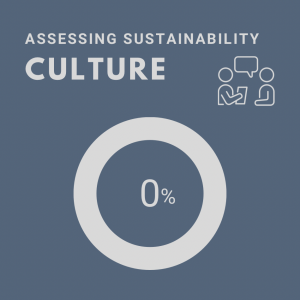 6. Assessing Sustainability Culture: In order to see where you’re going, you must see where
6. Assessing Sustainability Culture: In order to see where you’re going, you must see where
you’ve been. We can focus our efforts more effectively if we know exactly where the campus community is in terms of their sustainability knowledge. That is why STARS awards a point to institutions that have an assessment that measures the campus community’s values, culture, awareness, and beliefs surrounding sustainability.
Auburn’s Score: 0/1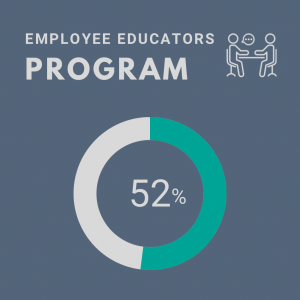
7. Employee Educators Program: Similar to student peer education programs, employees
should be given the opportunity to learn and teach sustainability to their peers. This allows for a sustainable culture to be built by those in the workplace.
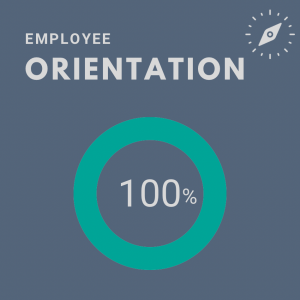 Auburn’s Score: 1.57/3
Auburn’s Score: 1.57/3
8. Employee Orientation: Like students, an employee’s first true taste of an institution can come from orientation. That is why it is crucial to include resources on sustainability at orientation. According to STARS, this can show the importance sustainability has on campus.
Auburn’s Score: 1/1
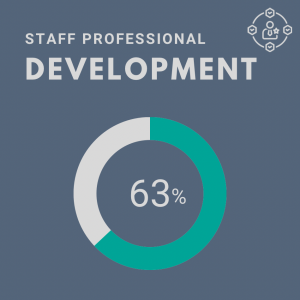 9. Staff Professional Development and Training: As previously mentioned, sustainability
9. Staff Professional Development and Training: As previously mentioned, sustainability
permeates every part of our lives. That is why institutions must give employees the opportunity and tools to learn about sustainability. STARS awards institutions that have these opportunities in place.
Auburn’s Score: 1.25/2
Auburn’s total score: 15.78/21
Reflections
Positives:
Auburn does exceptionally well at sustainability outreach on campus. We have an extensive list of events, drives, clubs, projects, and employment opportunities that students can be involved in. Employees can participate in most activities; however, we have some specific, employee-focused programs. Our Peers Network is a place where employees are trained to champion sustainability within their respective departments. That could mean leading a purchasing initiative or an energy conservation program. Without the work of our Peers Network Ambassadors, our Battery Recycling Program wouldn’t be at the scale it is currently. Finally, we have several means of online engagement, including our sustainability guides, newsletter, and website.
Opportunities:
We have a few ways to improve our on-campus engagement score.
- First, we could improve our student educators programming by offering more opportunities in varied areas. An amazing opportunity would be to add an Eco-Reps program within Auburn University Housing. These Eco-Reps would lead sustainability initiatives within their on-campus housing complexes and teach residents how to get involved with broader, on-campus sustainable initiatives.
- Secondly, STARS now grades the “Staff Professional Development and Training” category by the percentage of participation. However, we currently don’t have reliable metrics on many trainings and classes that could be related to sustainability or sustainability principles. We could thoroughly audit the professional development classes and trainings for sustainability principles. That way, we could have a broader understanding of what aspects of sustainability are being taught to who, where, and when.
- Finally, we could institute a campus-wide sustainability culture assessment. This would measure the entire campus community’s understanding of Auburn’s sustainability efforts and would provide valuable data to help us improve our on-campus engagement.
Action
Since this section corresponds to on-campus engagement, so should the action items.
Students:
- Join a sustainability-related co-curricular. Take a look at our student groups page and find a cause that resonates with you. You’ll work toward a solution in an issue you care about, more than likely, next to people who are like-minded.
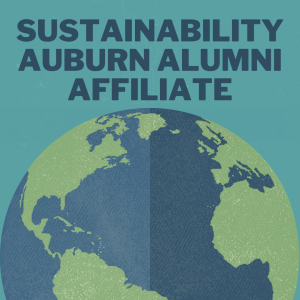
- If so inclined, think about applying for one of the student educator programs.
- If you have or are about to graduate, join the Sustainability Auburn Alumni Affiliate.
Employees:
- Contact the Office of Sustainability to arrange a sustainability assessment of your workplace.
- Our Working at AU page has an abundance of resources that you can use to deepen your understanding of sustainability and how it can apply to your work.
- Discover more ways to connect with the Office of Sustainability.
¹The Sustainability Tracking, Assessment, and Rating System (STARS) program is a self-reporting framework for institutions of higher education to track their sustainability performance created by the Association for the Advancement of Sustainability in Higher Education. Overall, STARS is made up of 211 possible points in 64 different subcategories. The subcategories are grouped by Academics, Engagement, Operations, and Planning & Administration. Additionally, participants may receive extra points for exemplary and innovative practices. In this summary, our score is shown over the amount of possible points for each credit. View Auburn University’s 2022 STARS Report for more details.
Learn about the SDGs & AU and our contributions related to this post.

